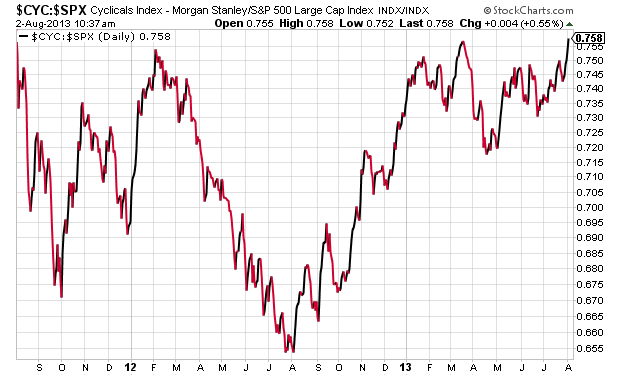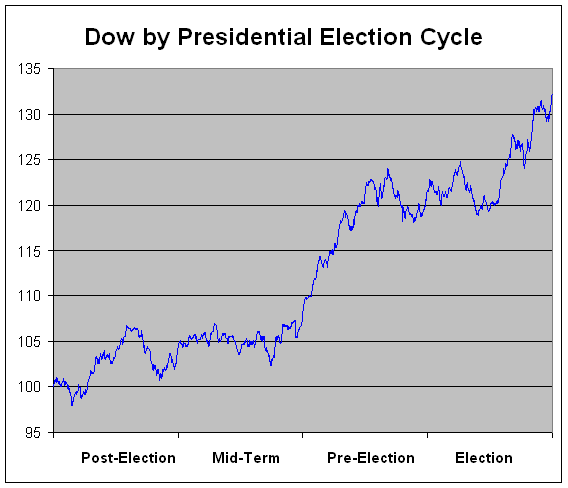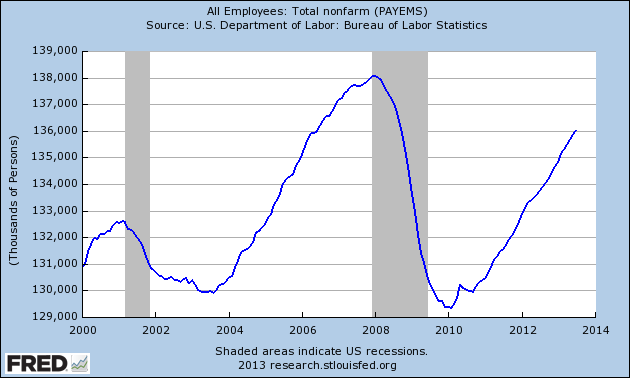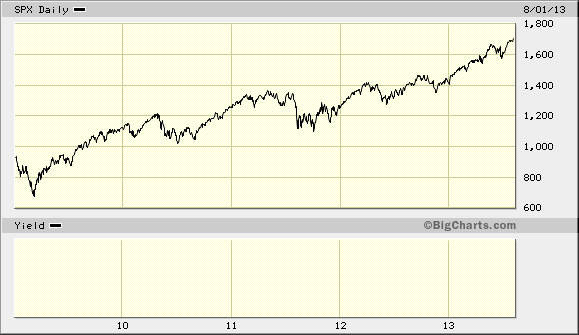Archive for August, 2013
-
Ford Can’t Make Its Cars Fast Enough
Eddy Elfenbein, August 5th, 2013 at 8:11 amDespite the weaker-than-expected jobs report on Friday, the S&P 500 managed to close higher and make another all-time high close. The futures so far indicate a flat open for the major indexes. Stocks in Europe rose for the sixth day in a row.
There’s been some interesting news in the bond market. Interestingly, it was exactly two years ago today that S&P made its foolish decision to cut the credit rating of the United States.
But what’s caught my attention recently is that the spread between yields on the five- and ten-year Treasuries is the widest it’s been in two years. If the dollar were falling this would probably be troublesome, but with a stronger dollar the wider spread probably suggests that the market is expecting stronger growth in the U.S.
Think of it this way: Treasuries will suffer as investors finally start to go back into riskier asset classes. That’s only natural. Bloomberg notes that “the cost to insure against default is the lowest since 2009, the dollar has risen the most since 2008 and the S&P 500 Index reached a record on Aug. 2.”
At TheStreet.com, Ted Reed notes that Toyota outsold Ford in the U.S. last month because Ford can’t build its cars fast enough:
In July, for the first time since March 2010, Toyota led Ford in U.S. auto sales, one more sign that Ford can’t make vehicles fast enough.
Ford has inventory shortages of the Fusion and the Escape, top sellers in the midsize sedan and utility segments, and plans to resolve them with production increases this fall. Until then, the automaker is losing an uncounted number of sales because it doesn’t have enough product.
In July, when U.S. light-vehicle sales rose 14%, Fusion sales fell 12% to 20,522 units and sales of Escape, the best-selling utility vehicle this year, rose just 3.6% to 22,343. During the month, Toyota — with light-vehicle sales in July of 193,394 — beat out Ford light-vehicle sales of 193,080.
-
Morning News: August 5, 2013
Eddy Elfenbein, August 5th, 2013 at 4:45 amChina Services to Manufacturing Suggest Slowdown Stabilizing
Berlusconi Turmoil in Italy Poses Threat to Euro-Crisis Lull
Norway’s $740 Billion Oil Fund May Be Restructured, Solberg Says
Topix Finds Friend in Bernanke as Abenomics Rally Slows
Miners Return to Hedging as Gold Prices Lose Shine
iPhone Reprieve Seen Aiding Apple Sales, Hurting Samsung
GM China Sales Growth Accelerates to 11.1% on Demand for Buicks
Embassies Hard Hit as HSBC Dumps Clients
The Last Temptation of Tina Brown
In Germany, Union Culture Clashes with Amazon’s Labor Practices
Analysts: Time Warner-CBS Blackout Could Last Until September
Bond Salesman Who Wasn’t Reveals RBS Human Errors
John Hempton: The Bad Guys Won One This Time…
Jeff Miller: Weighing the Week Ahead: A Vacation Snoozefest?
Be sure to follow me on Twitter.
-
Wise Words from Warren
Eddy Elfenbein, August 4th, 2013 at 6:21 pm -
A Look Back at August 2011
Eddy Elfenbein, August 2nd, 2013 at 11:57 amHere’s a look at what the market was doing two years ago from Gary Alexander:
As we enter a new month this morning, we can look back at a healthy (+5%) July, year-to-date gains of nearly 20% and an astounding 154% rise in the S&P 500 since March 9, 2009. But perhaps the most amazing measuring rod is the 51% gain since the market collapsed so sharply in August of 2011.
On August 2, 2011, Congress ended their month-long highly-contentious debt-ceiling debate when President Obama signed the Budget Control Act of 2011. The Dow fell 265.87 that day. Then, the Dow fell another 512.76 points on August 4, based on fears of the S&P downgrade of America’s credit rating. Then, over the next week, the Dow rose or fell by 423 points or more points in four consecutive days:
Manic-Depressive Market Mood Swings, August 8-11, 2011
Monday, August 8, Down 644.76, -5.55%
Tuesday, August 9, Up 429.92, +3.98%
Wednesday, August 10, Down 519.83, -4.62%
Thursday, August 11, Up 423.37, +3.95%The S&P debt downgrade may explain the knee-jerk 645-point drop on Monday, August 8, but it does not explain the euphoria represented by two days of 420+ point gains on Tuesday and Thursday that week.
-
Cyclical Index to S&P 500 Ratio Near Two-Year High
Eddy Elfenbein, August 2nd, 2013 at 10:39 am -
We’re At the Peak of the Election Cycle
Eddy Elfenbein, August 2nd, 2013 at 10:24 amI recently downloaded the entire history of the Dow going back to 1896 in order to compute what the average four-year election cycle looks like. The chart below is the result.
The Dow has historically peaked on August 4th of each post-election year (a Sunday this year, and President Obama’s 52nd birthday). The low point has historically come on September 30th of the mid-term year. Over that 14 month span, the Dow has lost an average of 4.10%. During the other 34 months, the Dow has gained an average of 37.93%.
Let me add that I would never base any investment decision on this kind of data. I merely think it’s interesting from an historical perspective.
-
July NFP = 162,000
Eddy Elfenbein, August 2nd, 2013 at 8:32 amThe July jobs report is out. The economy created 162,000 net new jobs last month. That’s below forecasts of 185,000. A total of 161,000 jobs were in the private sector. The revisions for May and June knocked off 26,000 from what was originally reported. The unemployment rate fell to 7.4%.
The market doesn’t seem to be reacting strongly one way or the other. I think traders have reconciled to the fact that tapering of some sort will begin in the fall.
-
CWS Market Review – August 2, 2013
Eddy Elfenbein, August 2nd, 2013 at 7:43 am“More money has been lost reaching for yield
than at the point of a gun.” – Raymond DeVoeThis has been one of our best earnings seasons in memory. In the last 27 trading days, our Buy List has soared 10.43%. Not bad! For the year, we’re up 24.25%, which means we currently lead the S&P 500 by more than 4.5%. This should be our seventh market-beating year in a row!
On Thursday, the S&P 500 broke 1,700 for the first time ever. For the day, the index closed at 1,706.87. This has been an amazing time for equity investors, and it has a very good chance of lasting. The Fed this week gave investors more encouraging signals on monetary policy. Not only that, but we had a very strong ISM report, and initial jobless claims reached a five-year low.
In this week’s CWS Market Review, we’ll review the recent slate of outstanding earnings reports. Stocks like Fiserv and Harris continued the trend of Buy List stocks smashing estimates and gapping up to new highs. Fiserv stock rallied 4% after its report and nearly hit $100 this week. Harris beat its estimates by an amazing 26 cents per share, and the stock surged 8% on Tuesday. Both AFLAC and WEX Inc. rallied to new highs on earnings beats as well.
We had one disappointment this week with DirecTV, but it’s been a very good stock for us. I also want to preview the remaining earnings that are due next week. But first, let’s look at this week’s earnings news.
Moog Is a Buy up to $57
We have a lot of earnings to run through, so let’s start with last Friday, when quiet little Moog ($MOG-A), the maker of flight-control systems, reported earnings of 90 cents per share. That topped Wall Street’s view by six cents per share. Quarterly sales rose 10% to $671 million.
I was pleased with Moog’s forward guidance. For the full year, Moog sees earnings coming in at $3.25 per share, but that includes two 15-cent charges. Note that Moog’s fiscal year ends in September, so the June quarter was their fiscal third. For next year (September 2013 to September 2014), Moog sees earnings ranging between $3.90 and $4.10 per share.
That’s a very optimistic outlook. The Street’s consensus for next year had been for $3.90 per share. With a 38.31% gain, Moog is our number-one performer this year. Moog continues to be a very good buy up to $57 per share.
Harris Crushes Earnings and Soars
Then on Tuesday, Harris Corp. ($HRS) absolutely demolished Wall Street’s forecast. For their fiscal fourth quarter, the communications-equipment company pulled in $1.41 per share, which was 26 cents better than consensus! The stock surged 8% on Tuesday and continued to close higher on Wednesday and Thursday as well.
Harris also had very good guidance for next year. For fiscal 2014, which ends next June, Harris sees earnings ranging between $4.65 and $4.85 per share on revenue of $4.95 to $5.05 billion. The Street had been expecting earnings of $4.62 per share on revenue of $5.03 billion.
The success we’re seeing now at Harris is the result of restructuring efforts undertaken earlier this year. Harris had actually been one of our poorer-performing stocks this year, but as is often the case, high-quality stocks eventually deliver the goods. I’m raising my Buy Below on Harris to $62 per share. This is a very solid stock.
I’m Raising my Buy Below on Fiserv to $103
After the bell on Tuesday, Fiserv ($FISV), which had been rallying pretty well going into earnings, had a great earnings report. For the second quarter, Fiserv earned $1.50 per share, which was six cents better than Wall Street’s estimate. Quarterly revenues rose 11.8% to $1.14 billion, which was a bit short of consensus.
Fiserv reiterated its full-year guidance of earnings ranging between $5.84 and $6.03 per share. Always take notice when a good company reiterates guidance. Too many investors see that as being “no news.” Not me. I like to hear that our stocks are still on track for the year. Looking at the numbers, I don’t think Fiserv will have any trouble hitting that range. For the first six months of 2013, Fiserv has earned $2.83 per share. Earnings are up 16% so far this year, and cash flow is up 22%.
Shares of FISV jumped 4% on Wednesday. At one point, the stock came within 12 cents of hitting $100 per share. I’m raising my Buy Below to $103 per share. Fiserv is an excellent buy.
AFLAC Surges Past $63 on Strong Earnings
Our beloved AFLAC ($AFL) reported Q2 operating earnings of $1.62 per share, which was 11 cents better than estimates. I liked that, and so did traders. AFLAC rallied 4.3% over the following two days and reached a new 52-week high.
Let’s dig into the details. Remember that with insurance companies, it’s more important to focus on their operating earnings. Three months ago, AFLAC gave us a range for Q2 of $1.41 to $1.56 per share, so business is going much better than expected. The problem, of course, is the yen/dollar exchange rate, which wound up knocking 22 cents per share off earnings last quarter. Ouch, that stings. But adjusting for that, AFL’s operating earnings rose 14.3%.
For Q3, AFLAC sees operating earnings ranging between $1.41 and $1.51 per share. That’s less than the $1.56 per share Wall Street had been expecting. For the full-year guidance, AFLAC lowered the low end of their range. The previous range was $5.99 to $6.37 per share. Now it’s $5.83 to $6.37 per share. That seems very conservative to me. Even after the rally, AFL is still going for less than 10 times the high end of their forecast.
Can you believe AFLAC was going for $43 a year ago? This has been such an impressive stock. This week, I’m raising my Buy Below on AFLAC to $67 per share. Excellent stock.
WEX Inc. Is a Buy up to $93
On Wednesday, WEX Inc. ($WEX) reported Q2 earnings of $1.05 per share, which was one penny better than expectations. For Q3, they see earnings between $1.16 and $1.23 per share. Wall Street had been expecting $1.18 per share. For all of 2013, WEX now sees earnings ranging between $4.27 and $4.37. The Street’s consensus was at $4.31 per share.
Traders liked the earnings news a lot. On Thursday, WEX got as high as $91.84. That’s nearly a 40% run in three months. In fact, my Buy Below prices are having trouble keeping up. This week, I’m raising WEX to $93 per share. Let’s hope I have to raise it again soon.
DirecTV Was Our Big Miss This Week
We had one disappointment this week with DirecTV ($DTV). For the second quarter, DTV earned $1.18 per share, which was 16 cents below expectations. Revenues rose 6.6% to $7.7 billion, which was slightly below forecasts. It’s actually not as bad as it sounds.
The big problem for the satellite-TV company was Latin America. Analysts were expecting Latam subscriber count to rise by more than 420,000. Instead, it rose by just 165,000. To put this into context, last year, DTV added 645,000 new subscribers in the region. DirecTV said that macroeconomic conditions were partly to blame, especially in Brazil. In the U.S., subscriber count fell by 84,000.
The stock pulled back 3% after the earnings report, which isn’t so bad. While the Q2 report wasn’t what I was expecting, I still like DirecTV. DTV is a good buy up to $67 per share.
Earnings Next Week from NICK and Cognizant Technology
I still don’t know when Nicholas Financial ($NICK) will report, but it will probably be soon. I’m expecting earnings around 40 cents per share. To me, what’s more important will be any dividend increase announced at their annual meeting later this month. I said last week that I think NICK can raise their quarterly payout to 15 cents per share, which is a 25% increase. Nicholas Financial remains a very good buy up to $16 per share.
Next Tuesday, Cognizant Technology Solutions ($CTSH) is due to report its second-quarter earnings. CTSH beat impressively for Q1 and guided higher for Q2. The company projected earnings of $1.06 per share for Q2. For all of 2013, they foresee earnings of $4.31 per share. CTSH is a good buy up to $76 per share.
That’s all for now. We’re finally heading into the back end of earnings season. Except for earnings, next week should be a fairly light week for news. I suspect traders will be digesting the news from Friday’s big jobs report. With the dearth of news, I wouldn’t be surprised to see the Volatility Index ($VIX) drop to a multi-year low next week. Be sure to keep checking the blog for daily updates. I’ll have more market analysis for you in the next issue of CWS Market Review!
– Eddy
-
Morning News: August 2, 2013
Eddy Elfenbein, August 2nd, 2013 at 7:15 amRBS Names McEwan CEO as Operating Profit Drops; Shares Decline
Amid Japan-China Political Deadlock, Progress Toward Freer Trade
Putin Shows Global Mojo to Russians as U.S. Fumes Over Snowden
Jobless Claims in U.S. Fall to Lowest Level in Five Years
Shale-Boom Profits Bypass Big Oil
Tourre’s Junior Staff Defense Seen Leading to Trial Loss
LinkedIn Sales Top Projections as Membership Surges
Lufthansa Q2 Operating Profit Down, Revenue Flat
British Airways Parent Wins Favor as Revamp Outpaces Lufthansa
Honda, Toyota Mid-Size Clash Aids Asian Makers’ U.S. Gain
Inside the Phone-Plan Pricing Puzzle
The Real Change In The Cost Of A Big Mac If McDonald’s Workers Were Paid $15 An Hour: Nothing
Credit Writedowns: Bank Runs: Who’s Going to Clean Up the Mess Afterwards?
Be sure to follow me on Twitter.
-
Is This a Good Time to Invest?
Eddy Elfenbein, August 1st, 2013 at 6:36 pmHere’s a recent question I had from an emailer, and my response is below:
Hi Eddy,
I’ve been reading your website off and on for the past couple of years and really find your site to be full of good information. I haven’t had money to invest in the market up until now and was looking into buying a few stocks. Since the market is at a high point right now a few people have cautioned me that it probably isn’t a great idea to invest now since the market could come crashing down.
I was wondering what your opinion on the market is and whether you thought it would be a bad idea to invest now or your opinion on if there ever is a so called “good time to invest”. Is it always a good time to invest as long as you make good stock choices?
Thanks for the help
Thanks for the kind words. Despite the big run-up in stock prices, I still think this is a good time to be in stocks. Of course, it greatly depends on which stocks you’re in, and I favor the high-quality stocks on my Buy List.
The argument for stocks is very simple, and it comes down to math. Right now, Wall Street expects the S&P 500 to earn $123 next year (that’s the index-adjusted figure). That means the stock market is currently going for 13.7 times next year’s earnings. Or you can say that the market has an earnings yield of 7.3%.
There’s nothing in the bond market close to 7.3% at the moment. The furthest-dated US Treasury will yield you 3.7%, and higher-rated corporates run around 4.4%. That’s a pretty big gap, and much wider than I think can be justified due to a risk premium. Stocks offer the best bang for your buck.
Although my Buy List is always 100% invested in stocks, there are times where I think it’s wise to put money in cash or invest in more defensive stocks. In the last 15 years we’ve seen the stock market get cut in half, not once but twice. That’s a fact of investing. Bad things will happen. Not can, but will. Investors should be prepared for that.
Best – Eddy
-
-
Archives
- April 2025
- March 2025
- February 2025
- January 2025
- December 2024
- November 2024
- October 2024
- September 2024
- August 2024
- July 2024
- June 2024
- May 2024
- April 2024
- March 2024
- February 2024
- January 2024
- December 2023
- November 2023
- October 2023
- September 2023
- August 2023
- July 2023
- June 2023
- May 2023
- April 2023
- March 2023
- February 2023
- January 2023
- December 2022
- November 2022
- October 2022
- September 2022
- August 2022
- July 2022
- June 2022
- May 2022
- April 2022
- March 2022
- February 2022
- January 2022
- December 2021
- November 2021
- October 2021
- September 2021
- August 2021
- July 2021
- June 2021
- May 2021
- April 2021
- March 2021
- February 2021
- January 2021
- December 2020
- November 2020
- October 2020
- September 2020
- August 2020
- July 2020
- June 2020
- May 2020
- April 2020
- March 2020
- February 2020
- January 2020
- December 2019
- November 2019
- October 2019
- September 2019
- August 2019
- July 2019
- June 2019
- May 2019
- April 2019
- March 2019
- February 2019
- January 2019
- December 2018
- November 2018
- October 2018
- September 2018
- August 2018
- July 2018
- June 2018
- May 2018
- April 2018
- March 2018
- February 2018
- January 2018
- December 2017
- November 2017
- October 2017
- September 2017
- August 2017
- July 2017
- June 2017
- May 2017
- April 2017
- March 2017
- February 2017
- January 2017
- December 2016
- November 2016
- October 2016
- September 2016
- August 2016
- July 2016
- June 2016
- May 2016
- April 2016
- March 2016
- February 2016
- January 2016
- December 2015
- November 2015
- October 2015
- September 2015
- August 2015
- July 2015
- June 2015
- May 2015
- April 2015
- March 2015
- February 2015
- January 2015
- December 2014
- November 2014
- October 2014
- September 2014
- August 2014
- July 2014
- June 2014
- May 2014
- April 2014
- March 2014
- February 2014
- January 2014
- December 2013
- November 2013
- October 2013
- September 2013
- August 2013
- July 2013
- June 2013
- May 2013
- April 2013
- March 2013
- February 2013
- January 2013
- December 2012
- November 2012
- October 2012
- September 2012
- August 2012
- July 2012
- June 2012
- May 2012
- April 2012
- March 2012
- February 2012
- January 2012
- December 2011
- November 2011
- October 2011
- September 2011
- August 2011
- July 2011
- June 2011
- May 2011
- April 2011
- March 2011
- February 2011
- January 2011
- December 2010
- November 2010
- October 2010
- September 2010
- August 2010
- July 2010
- June 2010
- May 2010
- April 2010
- March 2010
- February 2010
- January 2010
- December 2009
- November 2009
- October 2009
- September 2009
- August 2009
- July 2009
- June 2009
- May 2009
- April 2009
- March 2009
- February 2009
- January 2009
- December 2008
- November 2008
- October 2008
- September 2008
- August 2008
- July 2008
- June 2008
- May 2008
- April 2008
- March 2008
- February 2008
- January 2008
- December 2007
- November 2007
- October 2007
- September 2007
- August 2007
- July 2007
- June 2007
- May 2007
- April 2007
- March 2007
- February 2007
- January 2007
- December 2006
- November 2006
- October 2006
- September 2006
- August 2006
- July 2006
- June 2006
- May 2006
- April 2006
- March 2006
- February 2006
- January 2006
- December 2005
- November 2005
- October 2005
- September 2005
- August 2005
- July 2005





 Eddy Elfenbein is a Washington, DC-based speaker, portfolio manager and editor of the blog Crossing Wall Street. His
Eddy Elfenbein is a Washington, DC-based speaker, portfolio manager and editor of the blog Crossing Wall Street. His